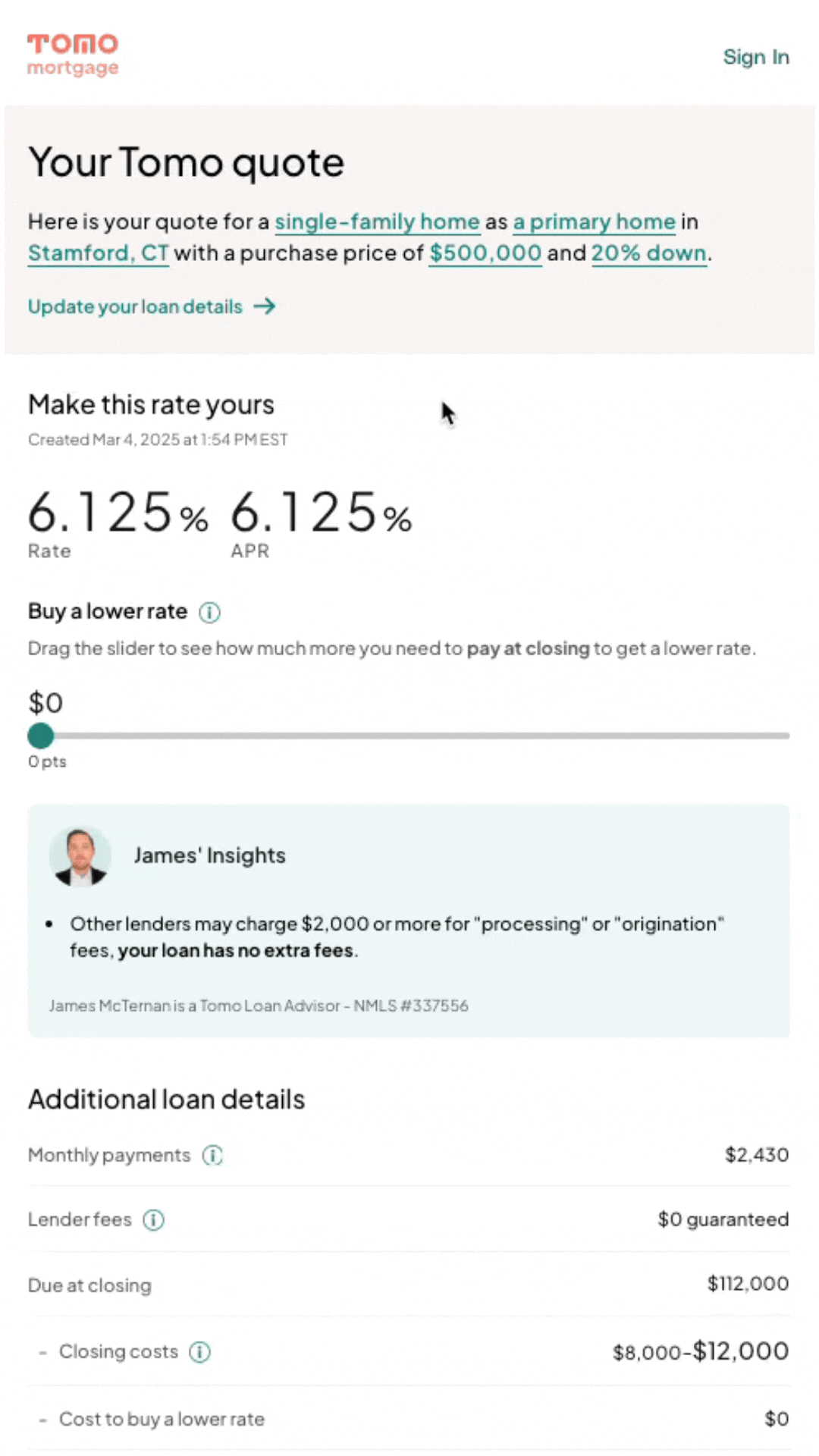Conventional mortgage Rates for today, Sept 12, 2025 as of 9:57 AM PT
Primary, Single Family Homes, $500,000 purchase price, 740 credit
| Location | Interest Rate | APR | Monthly Payment |
| Atlanta, GA | 6.125% | 6.125% | $2,430/mo |
| Austin, TX | 6.125% | 6.13% | $2,430/mo |
| Detroit, MI | 6.375% | 6.375% | $2,495/mo |
| Fort Lauderdale, FL | 6.125% | 6.125% | $2,430/mo |
| Hartford, CT | 6.375% | 6.381% | $2,495/mo |
| Seattle, WA | 6.375% | 6.375% | $2,495/mo |
Want to customize your rates?

Rates may change. See disclosures
This is not a commitment to lend. The stated rates depend on your particular financial situation and may change or not be available at the time of loan commitment or lock-in. Rates shown here are for conventional loans, less than 40%, and escrow account for payment of taxes and insurance. Closing costs (including points) need to be covered at closing. Monthly Payment amount does not include estimates for taxes, homeowners’ insurance, and mortgage insurance.
How to use this information
APR vs Interest rate → Look at APR when comparing two lenders, because one lender may advertise a lower rate but hide fees.
When to pay attention to each → Use interest rate to estimate your monthly payment; use APR to understand your total long-term cost.
Common misconceptions → A lower rate doesn’t always mean a cheaper loan if the APR is higher.
Glossary of terms
Rate
This is the interest you’ll need to pay back on your loan. These rates change daily until you find your property and lock your rate. Things like your credit score, desired location, and property type may also affect this rate.
APR
When you’re comparing lenders, you should always look at their APR. As with interest rate, the lower the better. Annual Percentage Rate (APR) is a more comprehensive way to look at your interest rate. It can include other costs such as mortgage insurance, if applicable, points, and closing costs.
Closing costs
There are many additional services you’ll need to pay for when buying your home such as appraisal and title. We’ve estimated these costs so that you can understand the full financial impact of the transaction. Your loan advisor can go over these with you later.
Points/credits
Points and credits determine your closing costs and your interest rate. Paying points mean you pay more at closing to get a lower interest rate. Taking credits means you pay less at closing and make up the difference with a higher interest rate. Your loan advisor can help you with this later.
Frequently asked questions
Is this better than other lenders?
Tomo Mortgage typically gives some of the lowest rates of the industry. See how we compare by checking True Rate.
What type of loan do most first-time homebuyers choose?
FHA loans are often earmarked as a first-time homebuyer loan. And while many first-time buyers may opt for FHA due to more lax restrictions, the majority of buyers (both first-time and repeat) actually go for conventional loans. According to HMDA data, 79% of all loans in 2023 were conventional, 12% were FHA, and 8% were VA.
How to pick what loan makes sense as a first-time buyer?
Here’s a quick guide:
- FHA Loan: Ideal if you have a lower credit score or can’t make a large down payment (as low as 3.5%).
- Conventional Loan: Great if you have good credit and can put down at least 3%, with fewer restrictions on the property.
- VA Loan: Best for veterans or active military members, often with no down payment required.
- USDA Loan: Perfect if you’re looking in a rural area and want a zero down payment option.
What’s the minimum down payment I need as a first-time homebuyer?
For most Americans, the minimum down payment will be 3-3.5% of the home’s price. A few exceptions apply if you qualify for a VA loan or a USDA loan, which offer zero down.
If you’re ready to start your journey to homeownership, get pre approved with Tomo Mortgage today.